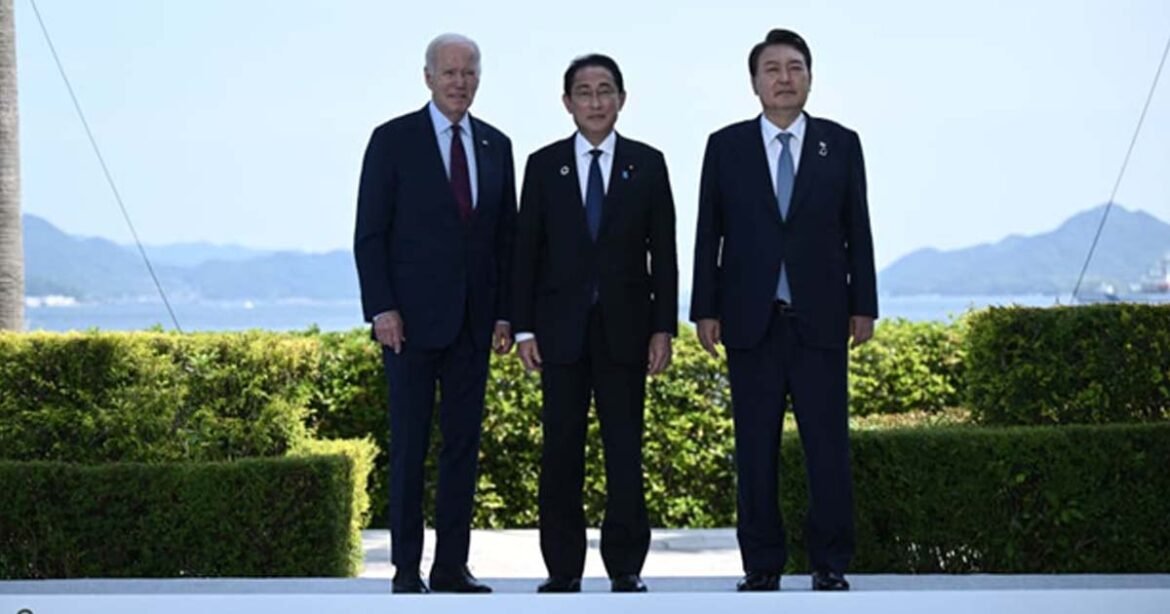In a resolute move to bolster security alliances in the Indo-Pacific, the United States is convening a landmark summit with Japan and South Korea. This strategic gathering is set to introduce a series of “ambitious” measures aimed at enhancing regional security, particularly in response to the escalating aggression displayed by China.
Today, President Joe Biden will unveil these measures in a momentous gathering at Camp David, accompanied by Japanese Prime Minister Fumio Kishida and South Korean President Yoon Suk Yeol. White House coordinator for Indo-Pacific affairs, Kurt Campbell, has emphasized the profound importance of this summit, which marks the first foreign leader’s visit to Camp David under President Biden’s tenure.

“This is the first foreign leader’s visit to Camp David in several years since President Biden took office,” Campbell said Wednesday at a Brookings Institution event previewing the summit.
You can also read: Can Arab allies safeguard interests amidst US-China rivalry?
He also stated, “I think we all understand the significance when a meeting is held there. The importance we attach to this important moment is to be signaled with deep symbolism. What you will see on Friday is a very ambitious initiative that seeks to hold back trilateral engagement both now and in the future.”
As the world watches this significant diplomatic event unfold, the three countries are poised to set forth a blueprint for stronger trilateral engagement, both in the present and the future. This move comes at a pivotal juncture, where geopolitical uncertainties and regional instabilities have driven these nations to prioritize their national security and cooperation.
Countering Aggression and Ensuring Stability
The anticipated summit will be the first stand-alone meeting between the US, Japan, and South Korea. This underscores Washington’s eagerness to capitalize on the blossoming relationship between its two closest security allies in Asia. Plans to institutionalize the summit as an annual event, along with investments in technology for a three-way hotline, are also on the agenda. These proactive steps will facilitate efficient communication among governments during critical situations, ensuring better coordination and response mechanisms.
The strategic significance of this gathering is further emphasized by the fact that the geopolitical landscape remains uncertain and unstable. Recent events, including the conflict in Ukraine and China’s assertive posture, have reshaped the priorities of nations, urging them to prioritize their national security over other matters. This shift in focus has been particularly evident in the Indo-Pacific region, where China’s actions and North Korea’s behavior have caused increasing concern.
China’s Role and Reactions
While this summit is pivotal for strengthening regional stability, it’s also noteworthy for its indirect impact on China. Beijing’s assertive behaviors and strategic posturing have been a source of apprehension for neighboring nations. In response, the US-led trilateral partnership aims to counterbalance China’s influence and encourage responsible international behavior. China, in response, has expressed its opposition to exclusionary groupings and practices that exacerbate hostilities and undermine the security of other nations.
Japan-South Korea Reconciliation
The forthcoming summit is poised to be a resounding victory for the White House, as it tirelessly advocated for the resolution of longstanding issues between Tokyo and Seoul, particularly concerning Japan’s wartime actions.
Throughout their tenure, President Biden and his senior team have wholeheartedly supported this endeavor. Kurt Campbell underlined this effort, highlighting the persistent “private, discreet dialogue” maintained with both nations. The Biden administration’s unwavering commitment has earned widespread recognition, with Victor Cha from the Center for Strategic and International Studies (CSIS) noting that the summit represents the culmination of year-long strenuous efforts within the administration.
Kurt Campbell also lauded the political courage demonstrated by Presidents Yoon and Kishida in their pursuit of reconciliation. This has been a remarkable feat, given the historical complexities that have burdened the Japan-South Korea relationship. He referred to their diplomacy as “breathtaking,” acknowledging the willingness of both leaders to take steps that defy conventional wisdom and elevate the bilateral ties to unprecedented levels.
President Yoon’s government, in a significant stride, announced a groundbreaking agreement in March. This agreement involved reparations to South Korean victims of Japanese wartime forced labor, a move that proved pivotal in enabling the resumption of shuttle diplomacy and the normalization of a military intelligence-sharing agreement between the two nations. This pivotal development represents a vital step towards healing historical wounds and fostering greater cooperation between Japan and South Korea.
Strengthening Democracy and Regional Influence
As the three nations convene at Camp David, the summit signifies a monumental effort to advance democratic principles, ensure stability, and establish a united front against potential threats. The unique approach employed in organizing this summit sets it apart, incorporating input from various stakeholders, including local administration and law enforcement officials. The establishment of a diverse committee ensures that decision-making is comprehensive and representative of all perspectives. This summit holds immense potential not only for the US, Japan, and South Korea but also for the broader Indo-Pacific region. The agreements and strategies outlined in this historic gathering pave the way for a secure and prosperous future, characterized by responsible global leadership and a commitment to regional stability


